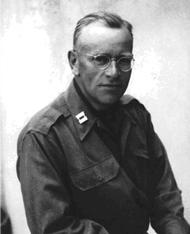Deane Keller
| Deane Keller | |
|---|---|

Deane Keller while a U.S. Army Captain, c. 1945
|
|
| Born |
December 14, 1901 New Haven, Connecticut |
| Died | April 12, 1992 (aged 90) Hamden, Connecticut |
| Resting place | New Britain, Connecticut, Pisa, Italy |
| Nationality |
|
| Alma mater | Yale University |
| Known for | Portraiture |
| Style | Traditional |
| Awards |
Prix de Rome (1926) Legion of Merit (1946) British Empire Medal (1945) |
Deane Keller (December 14, 1901 – April 12, 1992) was an American artist, academic, soldier, art restorer and preservationist. He taught for forty years at Yale University's School of Fine Arts and during World War II was an officer with the Monuments, Fine Arts, and Archives program.
Keller was born in New Haven, Connecticut in 1901. His father, Albert Galloway Keller, was a member of the junior faculty at Yale; but during young Deane's formative years, his father would become the first William Graham Sumner Professor of Sociology. Keller attended the Taft School in Watertown, Connecticut, graduating in 1919.
As a student at Yale, he earned degrees in history and science in 1923. Further studies led to a B.F.A. from the Yale School of Fine Arts in 1926. Keller was awarded the Gran Prix de Rome in 1926. He was a Fellow of the American Academy in Rome (FAAR) for three years. After returning from Rome in 1929, Keller began his career as a member of the Yale faculty.
His academic career was interrupted by the Second World War, when he was asked by School of Fine Arts dean Theodore Sizer to serve as a fine arts officer in the U.S. Army's Monuments, Fine Arts, and Archives program. At war's end, he returned to teach at Yale's School of Fine Arts. In total, Keller taught at Yale for forty years, retiring in 1979, and was also professor emeritus of painting at the Paier College of Art.
...
Wikipedia
